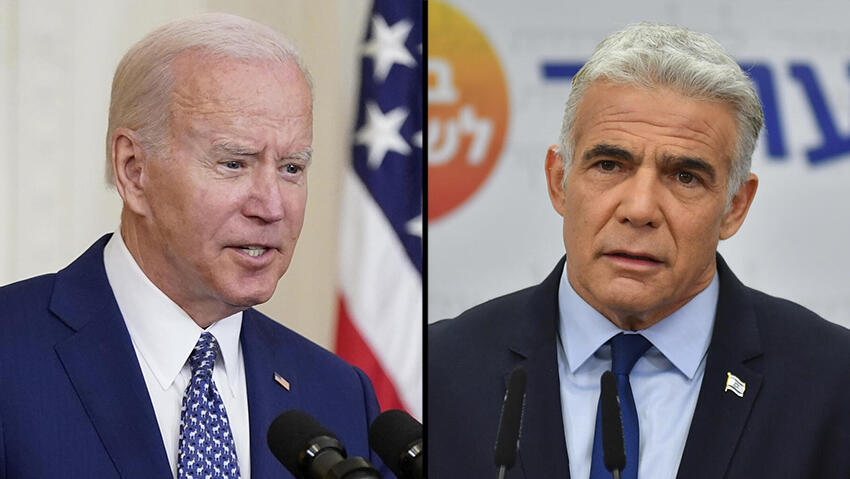Getting your Trinity Audio player ready...
Prime Minister Yair Lapid is expected to speak with U.S. President Joe Biden "in the coming days", sources within the White House said Wednesday night, to address Israel's concerns regarding the latest developments in talks between Iran and world power to salvage a tattered 2015 pact to rein in Tehran's nuclear program.
According to the sources, Biden is currently on vacation and will speak to the Israeli premier once his back in action.
Lapid slammed the emerging deal as a "bad agreement" as part of Israel's ongoing pressure campaign to influence the return to pact, which is viewed by Jerusalem as heavily skewed in Tehran's favor.
Speaking to foreign media at his office in Jerusalem, Lapid reiterated that Israel will not be bound by any such agreement between Iran and world powers and said that Israel will not stand having a "nuclear threat from an extreme and violent Islamist regime" over its head.
He added that the deal would provide Tehran with $100 billion per year to “spread terror around the globe.”
“On the table right now is a bad deal. It would give Iran a hundred billion dollars a year. This money will not build schools or hospitals. This is a hundred billion dollars a year that will be used to undermine stability in the Middle East and spread terror around the globe,” Lapid says.
White House sources stressed that Washington would insist on the Islamic Republic answering questions regarding open investigations by the International Atomic Energy Agency (IAEA) into alleged transgressions related to its nuclear program, contradicting reports claiming the United States has agreed to close the probes as part of far-reaching concessions in the talks.
Meanwhile, former prime minister and opposition leader Benjamin Netanyahu chided the Israeli government for what he considers its lax treatment of the Iranian issue, and claimed that the nuclear deal signed during his time in office was substantially better than the emerging one.
"I was ready to take unconventional steps," he told reporters Wednesday night, presenting as an example a 2015 speech he gave in the U.S. Congress that strained ties with then-U.S. president Barack Obama but failed to prevent the signing of the agreement.
Biden has been eager to revive the 2015 deal, which offered sanctions relief to Iran in exchange for curbs on Iran's nuclear program. The original deal unraveled after then-president Donald Trump withdrew from it in 2018 and reimposed sanctions, with strong encouragement from Israel.
It remains unclear whether the United States and Iran will be able to reach a new agreement. But the Biden administration is expected to weigh in on Iran's latest offer in the coming days. With an agreement appearing close, Israel has stepped up its efforts to block it.
Iran insists its nuclear program is for peaceful purposes only. The Islamic Republic has increasingly claimed that the Americans are now delaying the deal, even though Tehran spent months in back-and-forth negotiations that previously stalled in both Vienna and Qatar.
3 View gallery


A handout picture provided by the Iranian presidential office on April 10, 2021, shows a grab of a video conference screen of an engineer inside Iran's Natanz uranium enrichment plant
(Photo: AFP)
Israel's National Security Adviser Eyal Hulata is in Washington this week for talks with Biden administration officials, and Defense Minister Benny Gantz will head to the U.S. on Thursday for meetings with the head of the U.S. military's Central Command, which oversees operations in the Middle East, and National Security Adviser Jake Sullivan.
Lapid is serving as Israel's caretaker prime minister until elections on November 1, when he will face off against Netanyahu and other rivals. While the two men have deep differences, they hold virtually identical positions when it comes to Iran. In 2015, Netanyahu, now opposition leader, delivered a speech to Congress in an unsuccessful attempt to derail what would become Obama's signature foreign policy achievement.
Israel has long said it would not allow its regional archrival Iran to obtain nuclear weapons, and that it was not bound by the agreements between world powers and Tehran. It also has called for diplomacy to be accompanied by a "credible" threat to take military action against Iran if needed.
Associated Press contributed to this report.



